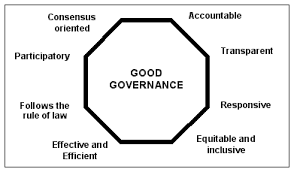-
27 Aug 2024
GS Paper 4
Theoretical Questions
Day 44: Good governance is about the balance between the people, the planet, and prosperity. Discuss.(150 words)
Approach
- Give a brief introduction to good governance.
- Discuss good governance is about balancing the people, planet, and prosperity.
- Conclude suitably.
Introduction
The World Bank defined Good Governance as “the manner in which power is exercised in the management of a country’s economic and social resources for development”.According to the United Nations, good governance is characterized by eight key attributes: it is participatory, consensus-driven, accountable, transparent, responsive, effective and efficient, equitable and inclusive, and adheres to the rule of law.
Good Governance is increasingly recognized as a holistic concept that must balance the needs of the people, the planet, and prosperity to ensure sustainable development.
Body
Balancing the People, Planet, and Prosperity
- People:
- Good governance prioritizes inclusivity, equity, and justice. It ensures that all individuals, especially marginalized groups, have access to basic services, opportunities, and rights, thereby fostering social stability and human dignity.
- Pradhan Mantri Awas Yojana (PMAY):By offering financial assistance for home construction and enhancement, the scheme addresses housing shortages, improves living conditions, and promotes social equity.
- Mahatma Gandhi National Rural Employment Guarantee Act (MGNREGA): Provides a safety net for the rural poor, supports livelihoods, and reduces rural-urban migration, contributing to social stability and economic security.
- Good governance prioritizes inclusivity, equity, and justice. It ensures that all individuals, especially marginalized groups, have access to basic services, opportunities, and rights, thereby fostering social stability and human dignity.
- Planet:
- Good Governance emphasizes environmental stewardship, recognizing that long-term prosperity depends on the health of the planet. This includes implementing policies that mitigate climate change, protect biodiversity, and promote the sustainable use of natural resources.
- Mission LiFE (Lifestyle for Environment):Aims to build a people-centric movement for environmental sustainability by integrating eco-friendly practices into everyday life, thus contributing to the global fight against climate change.
- National Clean Air Programme (NCAP):Addresses urban air pollution, aiming to reduce particulate matter and improve public health, demonstrating a commitment to environmental stewardship.
- Good Governance emphasizes environmental stewardship, recognizing that long-term prosperity depends on the health of the planet. This includes implementing policies that mitigate climate change, protect biodiversity, and promote the sustainable use of natural resources.
- Prosperity:
- Good governance promotes responsible economic policies that not only drive prosperity but also ensure that the benefits are shared equitably, reducing poverty and inequality.
- Strategies like Startup India and Digital India focus on fostering economic development and innovation, ensuring that prosperity is achieved through sustainable and inclusive practices.
- Good governance promotes responsible economic policies that not only drive prosperity but also ensure that the benefits are shared equitably, reducing poverty and inequality.
Challenges in Balancing People, Planet, and Prosperity:
- Resource Allocation Conflicts:
- Balancing industrial growth with environmental conservation can strain natural resources and lead to environmental degradation, affecting both marginalized communities and ecological health.
- Policy Implementation and Efficiency:
- Inefficiencies, bureaucratic delays, and corruption in implementing can undermine their effectiveness, impacting social equity and economic security.
- Economic Growth vs. Environmental Sustainability:
- Economic development initiatives, such as infrastructure projects, often conflict with environmental conservation goals, creating challenges in maintaining ecological balance while promoting prosperity.
- Public Participation and Technological Disparities:
- Low levels of public engagement and uneven access to digital infrastructure and technological resources can hinder the inclusivity and effectiveness of policies aimed at balancing social, environmental, and economic objectives.
Conclusion
Good governance balances the needs of people, the planet, and prosperity, crucial for sustainable development and achieving Sustainable Development Goals. To enhance this balance, India should expand social safety nets, strengthen education and skills, advance climate measures, promote innovation, foster inclusive policies, and improve transparency and collaborative governance.





